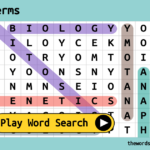Biology Terms That Start With L
1. Lipid
2. Locus
3. Ligament
4. Lactic acid
5. Lichen
6. Lysosome
7. Longitudinal section
8. Law of segregation
9. Law of independent assortment
10. Leucine
11. Lymphocyte
12. Leucoplast
13. Leydig cells
14. Lamina
15. Lumen
16. Lentivirus
17. Lattice
18. Lymphatic system
19. Ligand
20. Lacrimal gland
21. Leukocyte
22. Luteinizing hormone
23. Larva
24. Laminin
25. Lactose
26. Liverwort
27. Lux
28. Lactiferous ducts
29. Lateral line
30. Lateral meristem
More About Biology Terms That Start With L
Welcome to my blog, where we delve into the fascinating world of biology! Today, we will uncover a multitude of captivating and thought-provoking biology terms that all have one thing in common they start with the letter “L”. From the vast and intricate layers of life to the enigmatic chemical processes within living organisms, there is an abundance of terms awaiting exploration.
As we embark on this biological journey together, you will learn about the extraordinary diversity of life forms and the intricate mechanisms that govern their existence. Biology, often referred to as the science of life, is a multidisciplinary field that encompasses a broad range of topics, including genetics, ecology, physiology, and biochemistry. By focusing on specific terms that begin with “L,” we aim to shed light on some lesser-known aspects of this captivating field.
Our exploration begins with a fundamental concept in biology the cell. These microscopic building blocks are the foundation of all living things, possessing incredible complexity and diversity. One such term, “Lipids,” refers to a class of organic molecules that play crucial roles in cellular structure and function. Lipids include fats, oils, and waxes, and their presence within cell membranes allows for compartmentalization, protection, and regulation of biochemical processes.
Moving beyond the cell, we voyage into the intricate world of genetics. “Locus” is a term that highlights the specific position of a gene or DNA sequence on a chromosome. Understanding the loci of genes is essential in unraveling the intricacies of inheritance patterns and genetic disorders. Furthermore, we delve into “Linkage,” a phenomenon where genes located close to each other on a chromosome tend to be inherited together. Linkage plays a pivotal role in genetic mapping, allowing scientists to decipher the complex puzzle of an organism’s genetic makeup.
Our exploration proceeds to the realm of ecology, the study of how organisms interact with each other and their environment. Within this vast field, we encounter “Lentic Ecosystems,” such as lakes and ponds, where standing water fosters unique ecological communities. From algae to fish, these ecosystems provide habitats for a remarkable array of organisms, each playing a vital role in the delicate balance of nature.
As we venture deeper into the intricate web of biological connections, we encounter the concept of “Lamarckism.” Although largely discredited, Lamarckism is the theory that an organism can pass on acquired characteristics to its offspring. Initially proposed by Jean-Baptiste Lamarck, this theory has played a significant role in shaping our understanding of evolutionary biology.
In addition to genetics and ecology, our biological journey takes us into the captivating realm of physiology, where we explore the intricacies of living organisms’ functions. The term “Lymphatic System” takes center stage here. This network of tissues, organs, and vessels plays a crucial role in maintaining fluid balance, nutrient absorption, and immune response. Understanding the lymphatic system’s intricate workings provides insights into how our bodies defend against pathogens and maintain stability.
From the molecular level to the ecological networks that shape our world, biology encompasses a captivating array of terms starting with the letter “L.” This journey aims to uncover the depth and intricacy of life, highlighting concepts that often go unnoticed. By exploring these terms, we hope to arouse curiosity and ignite a passion for the remarkable science that surrounds us.
So, join me on this exciting adventure as we journey through the labyrinth of biology terms that begin with “L”. Together, let’s uncover the mysteries of life, expand our knowledge, and appreciate the awe-inspiring complexity of the natural world.
Biology Terms That Start With L FAQs:
1. Q: What is a lipid?
A: Lipids are a class of organic macromolecules that include fats, oils, waxes, and steroids. They are insoluble in water and serve various functions such as energy storage, insulation, and forming the cell membrane.
2. Q: What is lymph?
A: Lymph is a transparent fluid that circulates throughout the lymphatic system, carrying immune cells and removing waste products from tissues. It is derived from interstitial fluid and plays a crucial role in immune responses.
3. Q: What are lysosomes?
A: Lysosomes are small organelles found in animal cells that contain digestive enzymes capable of breaking down various cellular waste materials, microbes, and foreign substances.
4. Q: What is a limiting factor in ecology?
A: In ecology, a limiting factor refers to any factor that restricts the growth or distribution of a population within an ecosystem. Examples include food availability, water supply, temperature, and predation.
5. Q: What does the term “Lamarckism” mean?
A: Lamarckism refers to the now-discredited theory proposed by Jean-Baptiste Lamarck, which suggested that acquired traits during an individual’s lifetime are heritable and can be passed on to the next generation.
6. Q: What is a lactase?
A: Lactase is an enzyme primarily found in the small intestine of mammals, including humans. It breaks down lactose, a sugar found in milk and dairy products, into glucose and galactose, allowing its absorption.
7. Q: What is the function of the liver in the body?
A: The liver is a vital organ responsible for numerous functions, including metabolism, detoxification of drugs and toxins, bile production, storage of vitamins and minerals, and synthesis of proteins.
8. Q: What is a leukocyte?
A: Leukocytes, commonly known as white blood cells, are cells of the immune system that play a crucial role in defending the body against infections and foreign substances. They are produced in the bone marrow.
9. Q: What is the Law of Segregation in genetics?
A: The Law of Segregation, proposed by Gregor Mendel, states that during the formation of gametes, the two alleles for a trait segregate (separate) independently from each other, resulting in each gamete carrying only one allele.
10. Q: What is the process of meiosis?
A: Meiosis is a specialized cell division process that occurs in sexually reproducing organisms, resulting in the production of gametes (sperm and eggs). It involves two rounds of cell division and leads to genetic diversity due to recombination and independent assortment of chromosomes.




















